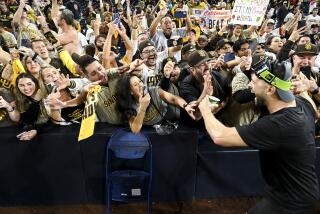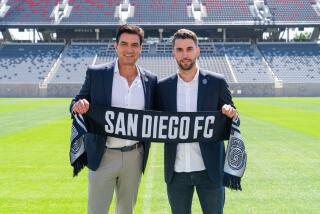Is It Adios From the Silver and Black?
Despite all the speculation that the Raiders will be leaving Los Angeles soon--returning to Oakland, whence they came, or maybe Sacramento--most local football fans have remained calm, even blase, about the situation. But last week I learned something that has convinced me that the team’s management is serious about getting out of Southern California.
The Raiders are not broadcasting their pre-season games in Spanish.
That fact, I know, is not as significant as their wrangling with the Los Angeles Memorial Coliseum Commission, the team’s unhappy landlord. Although they were once legal allies in fighting the National Football League, which tried to keep the team from leaving Oakland, Raider management and the commission have moved beyond bickering about Coliseum improvements and who will pay for them, and are suing each other for breach of contract and unpaid rent.
Nor does it rate a lot of attention when compared to the quasi-public flirtations that team representatives have carried on with officials in Oakland and Sacramento, who are offering between $32 million (Oakland) and $50 million (Sacramento) in “franchise fees” to lure the team back North. That money is nothing more than a bonus paid into the team’s coffers just for transferring operations, above and beyond what will be paid to build or refurbish whatever stadium the Raiders occupy.
But the lack of Spanish broadcasts is revealing, nevertheless. If there is one group of Los Angeles residents who tuned in (both literally and figuratively) to the Raiders when they began playing here in 1982, it was the Latino community. The fact that the Raiders were the first local football team to broadcast their games in Spanish--in fact, only the second team in the National Football League to do so--had a lot to do with it.
There were other factors that led to the Raiders’ almost instant popularity with local Latinos, of course. They had a Mexican-American head coach then, Tom Flores, and a tough Chicano quarterback, Jim Plunkett.
Team owner Al Davis also had the foresight to aggressively market his team to Latino fans (i.e., consumers). He hired an outgoing Mexican-American marketing specialist, Gil Lafferty-Hernandez, who became a minor local celebrity handing out Raider souvenirs at community affairs from San Fernando to Wilmington.
Then there was the Raiders’ reputation and style of play back in the early ‘80s. In their black jerseys, they had the image of outlaws and toughs. Being new in town, they were seen by many people as outsiders, even mercenaries. That appealed to Chicanos, too. For all our history and numbers in Los Angeles, some of us never shake the suspicion that we aren’t quite accepted around here, either.
Whatever the reasons, L.A.’s Chicano community clearly took the Raiders to its collective heart. Most Latinos may not have been able to afford season tickets, but they watched the team on TV and listened on the radio. Just count all the Raider caps and T-shirts Chicano youngsters wear. If the Dodgers had not brought Fernando Valenzuela along at about the same time, the Raiders might be the most popular local sports franchise in L.A.’s barrios today.
But that’s all history now. Two years ago, Flores was gently, but firmly, fired as head coach after a losing season. Plunkett retired before last season. Lafferty-Hernandez resigned his front-office job last year, too. And now there may be no broadcasts in Spanish.
For the record, of course, team spokesmen say they are working to set up a Spanish-language radio network that should be ready by the time the regular season starts next month. But the fact that they have gone this far without doing so is chilling.
The Raiders will play an almost-meaningless exhibition game against Houston in the Oakland Coliseum, their former home, on Saturday night. I say almost because, while the game will have no effect on the team’s record, it has been seized upon by still-loyal fans in Oakland as a chance to revive their once-ardent love affair.
Having just returned to Los Angeles from a month’s stay in the Bay Area, I can personally attest to the enthusiasm generated by the team’s return, however temporary. The game sold out in two hours (a notable contrast to the sparse crowds that turned out for two exhibition games the team has played in Los Angeles this summer). Raider banners flutter in downtown Oakland. Parties, civic banquets and other ceremonies will be held in conjunction with the game, as if it were the Super Bowl and not just a preseason contest. And the local politicians trying to lure the Raiders back to Oakland are hinting that team officials might use the homecoming to announce that they will return, once their contract with the Los Angeles Coliseum ends in 1992.
I considered that wishful thinking while in the Bay Area. Having returned home and seen that the Raiders have lost interest in keeping one of the few groups of fans, and friends, they made in the Los Angeles area, I’m not so sure any more. Local Latinos may soon be saying adios to their heroes in silver and black.
More to Read
Go beyond the scoreboard
Get the latest on L.A.'s teams in the daily Sports Report newsletter.
You may occasionally receive promotional content from the Los Angeles Times.










